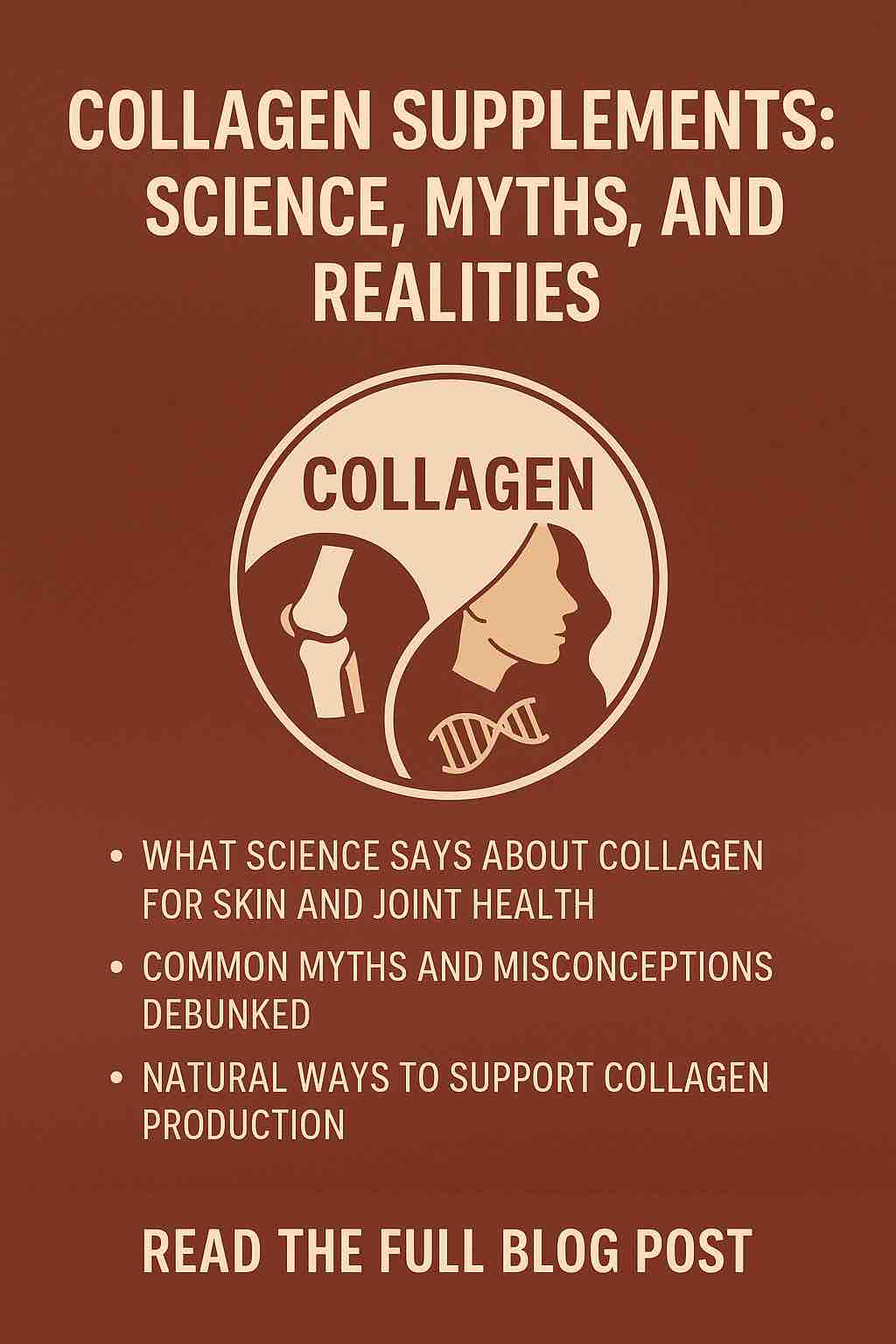
Unlocking the truth behind the beauty buzzword of the decade
Introduction: The Rise of the Collagen Craze
Walk into any health store, scroll through wellness influencers’ Instagram feeds, or browse your local café menu, and chances are you’ll find collagen everywhere — in smoothies, powders, gummies, capsules, and even cappuccinos.
Touted as a miracle fix for youthful skin, joint health, and glossy hair, collagen supplements have exploded into a multibillion-dollar industry. But behind the marketing glitz and celebrity endorsements, what does the science actually say? Are collagen supplements a fountain of youth or just another passing wellness fad?
Let’s dive into the facts, debunk the hype, and uncover the true potential of collagen supplementation.
What Exactly Is Collagen?
Collagen is the most abundant protein in your body. Think of it as the scaffolding that holds you together — it provides structure to your skin, bones, muscles, tendons, and ligaments. It’s what keeps your skin firm, your joints supple, and your bones strong.
There are at least 28 types of collagen, but the majority of the body’s collagen belongs to Types I, II, and III:
- Type I: Found in skin, bones, tendons; most abundant.
- Type II: Main component in cartilage.
- Type III: Supports the structure of organs and arteries.
But here’s the catch — collagen production naturally declines with age. Starting in your 20s, your body begins to produce less of it. The result? Wrinkles, sagging skin, joint pain, and brittle hair and nails.
Do Collagen Supplements Actually Work?
Let’s be clear: collagen supplements aren’t the same as the collagen in your body. What you’re taking is typically hydrolyzed collagen (also called collagen peptides), which has been broken down into smaller amino acid chains so it’s easier for your body to absorb.
Once ingested, your digestive system breaks those peptides down even further into individual amino acids, which your body can use to build proteins — not just collagen, but any protein it needs.
So, do those collagen peptides actually help your body make more collagen?
✅ What the Science Says
1. Skin Health
Several clinical trials suggest collagen supplementation can:
- Improve skin elasticity
- Enhance hydration
- Reduce wrinkle depth
A 2019 review published in the Journal of Drugs in Dermatology found that oral collagen supplements increased skin elasticity, hydration, and dermal collagen density. But most of these studies were small and funded by supplement companies — so while the early data is promising, it’s not bulletproof.
2. Joint and Bone Health
Some studies show that collagen can:
- Reduce joint pain in athletes
- Improve symptoms of osteoarthritis
- Increase bone mineral density in postmenopausal women
A 12-month study found that daily collagen peptide intake led to increased bone density in the spine and femur, suggesting long-term benefits for bone health. However, researchers still debate whether this is collagen’s doing or simply due to the high amino acid content.
3. Hair and Nails
This is where the evidence gets fuzzy. Many people swear collagen makes their hair shinier and nails stronger, but there’s little high-quality scientific research to support this. Anecdotal? Yes. Scientifically proven? Not yet.
Myths That Deserve a Collagen Comedown
Let’s bust a few myths while we’re at it.
❌ Myth 1: Collagen creams work just like supplements.
Not quite. Collagen molecules are too large to penetrate the skin’s surface. Most topical collagen products simply sit on your skin and provide hydration — they don’t boost collagen production.
❌ Myth 2: All collagen supplements are the same.
Nope. Collagen comes in different types (I, II, III), from different sources (bovine, marine, chicken, porcine), and in different forms (hydrolyzed, gelatin, undenatured). Your intended benefit — skin, joints, or bones — should dictate which you choose.
❌ Myth 3: Taking collagen guarantees visible results.
Your body decides how to use those amino acids — and it may prioritize repairing muscles or supporting organ function over making your skin glow.
Safety, Purity, and the Supplement Wild West
One major concern with collagen supplements is quality control. In the U.S., supplements aren’t regulated like pharmaceuticals — meaning what’s on the label isn’t always what’s in the bottle.
Independent lab tests have found:
- Heavy metal contamination (cadmium, lead)
- Low levels of actual collagen content
- Mislabeling of collagen types
If you choose to supplement, look for:
- Third-party tested products (e.g., NSF, USP, Informed Choice)
- Hydrolyzed collagen peptides for better absorption
- Transparency about sourcing (marine vs. bovine, etc.)
Should You Take Collagen?
The answer depends on your goals, expectations, and lifestyle.
✅ You might benefit if:
- You’re concerned about skin aging or joint stiffness.
- You struggle to get enough protein in your diet.
- You’re recovering from an injury or intense physical training.
❌ You probably won’t see results if:
- You expect overnight miracles.
- You’re already consuming enough high-quality protein.
- You ignore the basics: sleep, hydration, sun protection, and stress.
Natural Ways to Support Collagen Production
You don’t have to rely on supplements. Your body makes collagen — if you give it the right ingredients.
🥦 Nutrients that help:
- Vitamin C (citrus, bell peppers, kiwi)
- Zinc (pumpkin seeds, meat)
- Copper (nuts, shellfish)
- Proline and glycine (bone broth, egg whites, chicken skin)
🧬 Lifestyle habits that protect collagen:
- Wear SPF daily
- Avoid smoking
- Minimize sugar and alcohol
- Stay hydrated
- Get enough sleep
Conclusion: The Bottom Line on Collagen
Collagen supplements aren’t magic, but they’re not snake oil either. The science, while still evolving, does point to modest benefits — especially for skin and joint health. But results vary widely based on your age, health status, diet, and the quality of the product.
Think of collagen as one piece of a larger wellness puzzle. It might help — but it’s no replacement for healthy living.
Further Reading and Resources
- Harvard Health: Considering Collagen?
- NutritionFacts.org: Do Collagen Supplements Work?
- Healthline: 8 Science-Backed Collagen Benefits
🔍 Frequently Asked Questions (FAQs)
1. What are collagen supplements made from?
Most collagen supplements are derived from animal sources like bovine (cow), marine (fish), chicken, or porcine (pig). The collagen is hydrolyzed into peptides to improve absorption. Always check the label for the source — marine collagen is popular for skin health, while bovine is typically used for joint and general support.
2. How long does it take to see results from collagen supplements?
Results vary, but most clinical studies report noticeable changes after 8 to 12 weeks of consistent use. Skin hydration and elasticity improvements are usually seen first, followed by potential joint and bone health benefits.
3. Is it safe to take collagen every day?
Yes, collagen supplements are generally considered safe for daily use. Most studies use doses ranging from 2.5 to 10 grams per day. However, if you have allergies (especially to fish or eggs), consult your doctor before starting.
4. Can collagen supplements help with joint pain?
Some evidence suggests collagen may reduce joint pain, particularly in individuals with osteoarthritis or athletes with overuse injuries. Type II collagen is typically used for joint-specific benefits.
5. Are collagen supplements suitable for vegetarians or vegans?
No, natural collagen is derived from animals. There are vegan “collagen boosters” made from plant-based ingredients that help stimulate the body’s own collagen production (e.g., vitamin C, silica, amino acids), but they do not contain collagen.
6. What time of day should I take collagen?
There’s no “best” time — collagen can be taken any time of day, with or without food. Many people add it to morning coffee, smoothies, or post-workout shakes for convenience.
7. Can I take collagen with other supplements?
Yes, collagen is often combined with vitamin C, which enhances collagen synthesis. It’s also commonly paired with hyaluronic acid, biotin, and zinc in beauty supplements. Always avoid redundant combinations that could lead to excess intake.
8. Does collagen help with weight loss or muscle gain?
Collagen is a protein and may support muscle recovery when used alongside resistance training. However, it’s not a weight-loss supplement and should not replace complete proteins like whey or plant-based blends if muscle building is the goal.
9. What’s the difference between collagen, gelatin, and collagen peptides?
- Gelatin is cooked collagen and gels in liquids (used in cooking).
- Collagen peptides (aka hydrolyzed collagen) are broken-down forms that dissolve in hot/cold liquids and are better absorbed.
- Both come from the same source but differ in structure and usability.
10. Can collagen supplements replace a healthy diet?
No. Collagen is a complement, not a substitute. A diet rich in protein, vitamin C, and other micronutrients is still essential for optimal collagen production and overall health.











